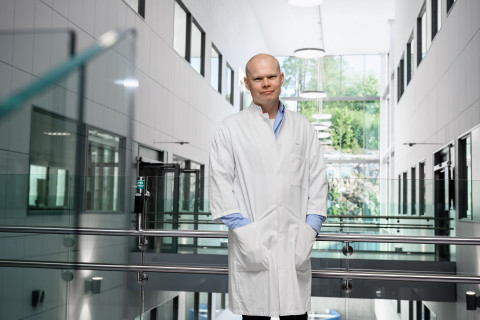Registers shed light on the quality and effectiveness of care
What kind of treatment for osteoarthritis or back pain is effective and helps patients cope with their daily life? According to Professor Joonas Sirola, answers can be found in register data. “A vast amount of data on the population is accumulated in various registers, shedding light on the effects of different treatments on people’s health status and functional capacity later in life.”
Joonas Sirola started as Professor of Orthopaedics and Traumatology (50%) at the University of Eastern Finland in April 2024. He also works as Chief Physician at Kuopio University Hospital, KUH, where he performs joint replacement surgeries.
Advancing to the professorship on the Tenure Track, Sirola’s work and research environments haven’t really changed since his appointment. Sirola’s key research interests include, for example, artificial joint replacements and spine surgery. “With register data, it is possible to predict the outcomes and risks of different treatments, and also to compare the quality of care across different healthcare units.”
Results from the first randomised clinical trial comparing the effectiveness of hip replacement surgery and conservative treatment, i.e., rehabilitation and physical therapy, for osteoarthritis of the hip will also be published soon. “This kind of a pragmatic, double-blinded study is yet to be published.”
Sirola has conducted research into osteoporosis and sarcopenia as part of the extensive OSTPRE project, which has been following more than 14,000 women in North Savo for over 30 years. In particular, the project has contributed to the identification of risk factors for osteoporosis, fractures and musculoskeletal disorders in aging women. The project has, among other things, conducted the world’s longest follow-up into bone density loss after menopause. According to the results, the density of the femoral neck bone decreased by an average of 10 per cent in 25 years, which is significantly less than what had been concluded from previous, shorter-term studies.
"Now, these women’s working-age children and grandchildren are being invited to a cross-generational study, where we examine how health behaviours, healthcare service use and morbidity are transferred across generations."
Musculoskeletal disorders are a significant public health issue. Back pain is one of the most common reasons for health care visits and disability, and about 80 per cent of people aged 80 have osteoarthritis. The cross-generational OSPTRE study also examines, for example, how factors associated with mental health run in families.
Medical education and medical education research
Sirola is in charge of medical education in his field, and medical education is also something he studies. “In medical pedagogy research, we examine, for example, how the use of simulation and virtual reality in the field of surgery enhances learning. In the current competence-based medical specialist education, the competence gained is sought to be assessed more systematically, and we are investigating the practical feasibility of various assessment tools.”
Sirola is actively promoting the use of simulation as well as digital methods and learning platforms in medical education. “Recently, KUH acquired an arthroscopy simulator, which has been in frequent use. It offers an important opportunity for safe practicing of arthroscopy skills and, related to this, we are organising a national training event, the Kuopio Arthroscopic Simulator Course, at the end of May. The upcoming course will be the third of its kind already.”
“Better availability of online education, on the other hand, is something many students nowadays wish for, and it is a modern way to complement in-class education.”
Sirola also serves as Deputy Head of the university’s Institute of Clinical Medicine, and he leads the Clinical Research Centre, under whose umbrella operate, among others, the Kuopio Musculoskeletal Research Unit, the Brain Research Unit, and the Diabetes and Heart Disease Research Unit. In the coming years, the university and KUH will develop their operating model for clinical research – i.e., medical research conducted on humans – in a direction enabling increasingly seamless integration of research, education and university-business collaboration in the different fields of medicine.
Joonas Sirola
Professor of Orthopaedics and Traumatology, University of Eastern Finland, 1 April 2024-
- Lic. Med., University of Kuopio 2004
- MD, University of Kuopio 2004
- Specialist in Orthopaedics and Traumatology, KUH/ University of Eastern Finland 2010
- Title of Docent, University of Eastern Finland 2013
- Special Competence in Medical Education, Finnish Medical Association 2023
Key roles:
- Associate Professor (50%), University of Eastern Finland 2020-2024
- Clinical Instructor, Research Director, Professor, University of Eastern Finland 2013-2019
- Chief Physician, KUH, Orthopaedics, Traumatology and Hand Surgery Clinic, 2017-
- Medical Specialist, Postdoctoral Researcher, KUH 2010-2017
- Academy of Finland Postdoctoral Researcher, 2004-2010


